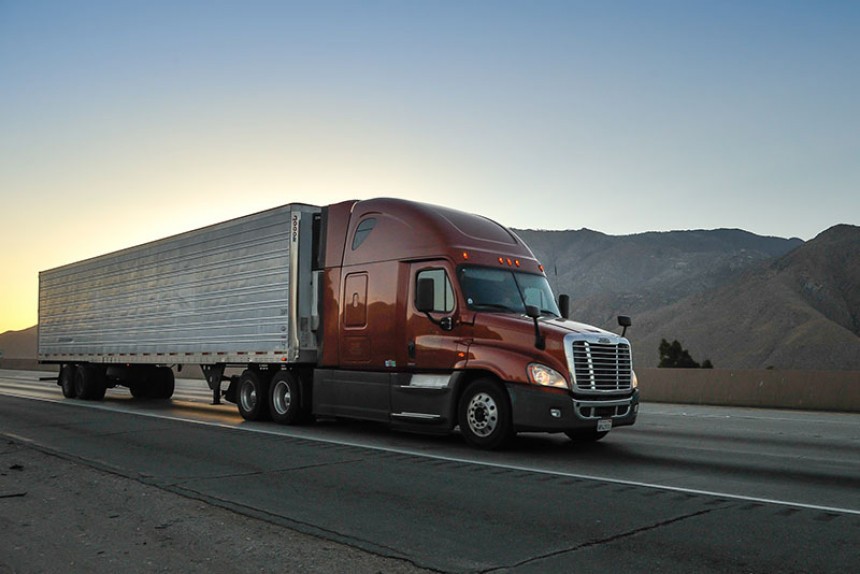Unlike with other types of modern pirates (think porch pirates, for instance), there is absolutely nothing random about the M.O. of truck pirates.
Cargo theft remains a highly lucrative business for the thieves, and an increasing financial hemorrhage for the trucking companies involved.
With so much money involved, there is no room for error and, let’s be honest, you can expect a lot of mistakes if you approach a heist randomly.
There are 2 main tactics of cargo theft, each with plenty of variants that change as criminals switch up their game to leverage technology and other advantages in order to boost their profit. The first one is straight cargo theft, which is exactly what it sounds like. Thieves will approach a trailer unmarried to the tractor and drive off with it, or steal the tractor trailer from a parking lot, when the driver stepped out for gas and snacks.
Thieves may act randomly when using this tactic, but if they’re prevented from stealing the goods, they will turn to the other ideas. Strategic cargo theft is the more evolved, polished, older sibling of straight cargo theft. Criminals will use technology to appropriate the cargo or they may pilferage the trailer on the road, without the driver even knowing about it.
When thieves turn to technology for help, they have everything well planned out, including an entire team for scouting and surveillance of the lot where the trailer is at. Regardless of whether they use social engineering, spoofing, injecting malware into the carrier’s database, identity theft or fictitious pickups, the end game is always the same: they pass for a legitimate driver with forged ID and documentation, they load the cargo and off they go.
The number of cargo theft incidents is slightly on the rise, even though it’s also under-reported. In some cases, trucking companies won’t even report the theft to the police because the driver had no idea of what happened until he got to his destination, and because they don’t want to risk increased premiums. In other cases, when the theft occurred during one of the stops, the driver can’t tell exactly when one he was robbed, so this makes it harder for the police to investigate.
“It’s become more apparent in recent years, but pilferage has always been the larger part of the iceberg just below the surface,” Scott Cornell, crime and theft specialist at Travelers Insurance, tells Transport Topics in a 2018 interview. “There’s often a lag in detection that there has even been a theft because the drivers may not realize it until they reach the point of delivery, after making multiple stops along the route. As a result, the police may be reluctant to file a report if the driver is unsure of where the theft occurred.”
One of the most spectacular methods truck pirates use, which got plenty of media attention in the few instances when the thieves were caught, is when the criminals steal the goods while the truck is still in motion. If it’s sounds like something out of a heist movie, it’s because it’s exactly like that. The thieves will approach the trailer from behind in another car and, as the car tailgates the trailer, one of the thieves will climb up on the roof and move to the door, which he will break to gain access inside.
In 2017, the Dutch police caught a ring of thieves who operated this way, after a years-long investigation and several big heists, including one in which they made away with iPhones worth more than half a million dollars. You can see them in action in the video below, but this was the one instance in which they changed their minds and aborted the operation half-way.
As you may have guessed, electronics and domestic appliances rank high with cargo thieves, as do food items, building supplies and even shoes. Foods and consumables are usually preferred because they’re easier to dispose of on the black market and also because, once consumed, they leave no trace. Yet the daredevils who rob trucks on the go rarely go for food stuff, and part of the reason is that they can’t possibly take the entire load. So they have to make sure their profit is high even if they only steal a fraction of the haul.
To minimize the odds of cargo theft, trucking companies have long started investing in a good relationship with staff and training tailored for this type of incidents. Drivers are urged not to share travel schedules or cargo details with anyone, to inspect the trailer after each stop, to lock up everything whenever they’re not around, and to drive for at least 200 miles before their first stop, which is enough for a pursuer to give up.
They’re also told to call 911 the moment they see something strange, whether it’s with their own cargo or some other driver’s. Or, as Jeff Messer, security and safety analyst with carrier CFI puts it for the same media outlet, “A good witness is better than an endangered driver.”
Words to live by, if you’re a truck driver.
There are 2 main tactics of cargo theft, each with plenty of variants that change as criminals switch up their game to leverage technology and other advantages in order to boost their profit. The first one is straight cargo theft, which is exactly what it sounds like. Thieves will approach a trailer unmarried to the tractor and drive off with it, or steal the tractor trailer from a parking lot, when the driver stepped out for gas and snacks.
Thieves may act randomly when using this tactic, but if they’re prevented from stealing the goods, they will turn to the other ideas. Strategic cargo theft is the more evolved, polished, older sibling of straight cargo theft. Criminals will use technology to appropriate the cargo or they may pilferage the trailer on the road, without the driver even knowing about it.
When thieves turn to technology for help, they have everything well planned out, including an entire team for scouting and surveillance of the lot where the trailer is at. Regardless of whether they use social engineering, spoofing, injecting malware into the carrier’s database, identity theft or fictitious pickups, the end game is always the same: they pass for a legitimate driver with forged ID and documentation, they load the cargo and off they go.
“It’s become more apparent in recent years, but pilferage has always been the larger part of the iceberg just below the surface,” Scott Cornell, crime and theft specialist at Travelers Insurance, tells Transport Topics in a 2018 interview. “There’s often a lag in detection that there has even been a theft because the drivers may not realize it until they reach the point of delivery, after making multiple stops along the route. As a result, the police may be reluctant to file a report if the driver is unsure of where the theft occurred.”
One of the most spectacular methods truck pirates use, which got plenty of media attention in the few instances when the thieves were caught, is when the criminals steal the goods while the truck is still in motion. If it’s sounds like something out of a heist movie, it’s because it’s exactly like that. The thieves will approach the trailer from behind in another car and, as the car tailgates the trailer, one of the thieves will climb up on the roof and move to the door, which he will break to gain access inside.
As you may have guessed, electronics and domestic appliances rank high with cargo thieves, as do food items, building supplies and even shoes. Foods and consumables are usually preferred because they’re easier to dispose of on the black market and also because, once consumed, they leave no trace. Yet the daredevils who rob trucks on the go rarely go for food stuff, and part of the reason is that they can’t possibly take the entire load. So they have to make sure their profit is high even if they only steal a fraction of the haul.
To minimize the odds of cargo theft, trucking companies have long started investing in a good relationship with staff and training tailored for this type of incidents. Drivers are urged not to share travel schedules or cargo details with anyone, to inspect the trailer after each stop, to lock up everything whenever they’re not around, and to drive for at least 200 miles before their first stop, which is enough for a pursuer to give up.
They’re also told to call 911 the moment they see something strange, whether it’s with their own cargo or some other driver’s. Or, as Jeff Messer, security and safety analyst with carrier CFI puts it for the same media outlet, “A good witness is better than an endangered driver.”
Words to live by, if you’re a truck driver.










